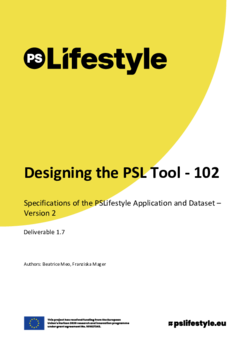D1.7 Designing the PSL Tool Specifications of the PSLifestyle Application and Dataset
In 2017, the Finnish Innovation Fund Sitra developed a digital tool for citizens to understand the impacts of their lifestyle and consumption habits called the “Lifestyle Test”. After taking the test, the citizens were presented with a series of alternative lifestyle options with associated emission reductions. The test has been done over a million times in Finland.
Following the first application, the Horizon 2020 project PSLifestyle, aims at expanding the user base and potential impact of the tool by improving it with new features and adapting it to the context of eight European countries: Estonia, Finland, Germany, Greece, Italy, Portugal, Slovenia, and Turkey. The result of this process is the launch of the PSL tool.
Following the first round of citizens science labs aiming at localizing the PSL tool, this report provides an overview of the design and implementation process of Lab Iteration 2 and their findings. The contextualization of the tool is essential since the tool needs to reflect different local realities around Europe, for example, capabilities, opportunities, and motivations of the citizens in engaging in more sustainable lifestyles. In addition, taking feedback from many diverse sets of citizens could increase the acceptability of the tool across the different regions, also.
The analysis of the results from Lab Iteration 2 show useful inputs were given in all countries to support the localization of the Smart Everyday Actions (SEAs). Participants pointed out the need to review wording, language and content used for some of the SEAs presented (especially for the Housing and Food domains) to improve both comprehension and relevance of the action list.
The results from meeting 4 reveal a general appreciation for the tool and its final goals, but a better interface – tool structure and design- and content visualisation – data, information, etc.- was requested to facilitate the user experience and enhance the user journey. Moreover, participants pointed out the elements like reminders, sharing features and planning calendars would help provide a better user engagement.
Publication Date: 22 Dec 2022
This project has received funding from the European Union’s Horizon 2020 research and innovation programme under grant agreement No 101037342.
